Investor Types Every Startup Founder Should Know
An article we liked from Thought Leader Julian Droste of BaseTemplates:
6 Types of Investors for Startups
The six types of Investors every entrepreneur should know about
For those seeking seed capital, there are six primary funding sources:
self funded, friends and family, crowdfunding, accelerator programs, angel investors and venture capitals (VCs).
Each group invests in startups at different stages and typically contributes varying levels of funding. As such, founders will need to consider which investor is best suited to their venture, its current needs and long-term objectives.
Self Funded
Founders who support projects themselves maintain complete ownership of their businesses and don't have to accommodate others in the decision-making process.
It is also the cheapest way to finance your venture. However, you may miss out on the networking opportunities and expert advice a successful seeding round can generate.
Funds for these projects typically come from re-invested profits or 'bootstrapping', where founders sell other services and invest that revenue into the business.
Friends and Family
Friends and family will most likely invest in your venture to support you, but you should make it clear that they are buying equity in your company, and how much.
Make sure they understand the risks involved; most startups fail, and they probably won't get their money back.
Investments from friends and family are a great way to raise relatively small amounts – around $5,000 – for the initial startup phase.
Crowdfunding
Platforms like Indiegogo and Kickstarter allow lots of strangers to invest small sums.
With five-figure campaigns becoming more and more common, this funding method is growing in popularity among those looking to raise seed capital.
Of course, no one wants something for nothing, and founders must choose whether to sell equity or reward backers with perks such as discounted products or early delivery.
Campaigns only get funded if they meet their pledge goal.
There is a high failure rate, but for those that are successful, there are additional benefits to running a campaign, which can be used to market a product, increase pre-sales, and test pricing.
Accelerators
Accelerators don't invest in your venture to the same extent that an angel investor or venture capital might do, but they do offer a gateway to funding.
These closed groups provide selected startups with access to a network of mentors, investors, suppliers, vendors and other useful contacts.
They also supply educational services and advice to help refine your business model.
Approved startups typically give up equity in exchange for access to an accelerator's network.
When applying to an accelerator group, it is important to...
Read the rest of this article at basetemplates.com...
Thanks for this article excerpt to Julian Droste, Founder, Digital Marketer & SEO at BaseTemplates.
Photo by Kampus Production
Want to share your advice for startup entrepreneurs? Submit a Guest Post here.
